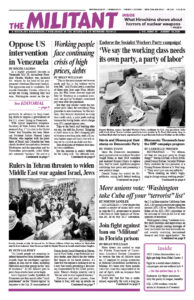Hamas’ Oct. 7 Jew-hating pogrom in Israel killing some 1,200 people in a single day and Moscow’s murderous invasion and war on the Ukrainian people mark a watershed in world politics. Capitalist rulers worldwide are preparing for future wars, jacking up their military budgets and looking for new allies to defend their markets, profits and spheres of influence. Against this background, the 79th anniversary of the atomic bombings of Hiroshima and Nagasaki stands as a horrific reminder of the costs of imperialist war for working people.
President Harry Truman ordered the dropping of “Little Boy,” a uranium-based atomic bomb with the explosive capacity of 15,000 tons of TNT on Hiroshima Aug. 6, 1945. It killed 140,000 people and razed 70% of all buildings.
Three days later “Fat Man,” a slightly larger plutonium atomic bomb, was dropped on Nagasaki, killing 74,000 civilians. Tens of thousands more later died from radiation poisoning and cancers. The temperature at ground zero reached 7,200 degrees Fahrenheit, followed by a radioactive rain.
“I didn’t have a single scratch. I had been saved by Mount Konpira,” Reiko Hada, who was 9 years old when the bomb hit Nagasaki, told British photojournalist Lee Karen Stow in 2015. “But it was different for the people on the other side of the mountain. They suffered atrocious conditions.
“My mother grabbed towels and sheets at home and, with other women in the community, led the fleeing people to the auditorium of a nearby commercial college,” she said. “After drinking a sip of water, they died. People died one after another.”
U.S. government claims that the bombings saved lives by ending World War II are a grotesque fiction. “The Japanese had, in fact, already sued for peace. The atomic bomb played no decisive part from a purely military point of view,” Adm. Chester Nimitz, who served as commander in chief of the U.S. Pacific Fleet, later admitted.
Instead, Washington’s nuclear attacks were a warning to the Soviet Union, rival capitalist powers and working people worldwide that U.S. imperialism not only had the bomb, but also the ruthlessness to use it. That hasn’t changed.
Washington lost the Cold War
Today the political and military alignments that have shaped the global imperialist order since Washington emerged as the top dog coming out of World War II are being battered by capitalist instability, sharpening rivalry and conflicts.
After the implosion of the Soviet Union in 1991, the U.S. rulers operated on the false idea that they had won the Cold War and had an open field to do as they wished in the world. This led to the U.S. invasion of Iraq, which ended in disaster, followed by its defeat in a 20-year war in Afghanistan, where its remaining troops fled in ignominy in 2021.
“The Gulf war held a mirror to the declining capitalist world order and accelerated its contradictions,” says New International magazine no. 7 of its article “Washington’s Assault on Iraq: Opening Guns of World War III.”
“It sounded the opening guns of sharpening conflicts and class battles that will decide whether the horrors of World War III are inflicted on humanity… or a road is opened by working people to a socialist future of international human solidarity.”
This crisis is even deeper today. As long as the dictatorship of capital remains there is no solution to imperialism’s march toward fascism and war.
The possibility of the use of weapons of mass destruction in today’s world can be seen not only in the reactionary Islamist rulers in Tehran and their drive to develop nuclear arms and delivery systems. It’s also shown by Russian President Vladimir Putin’s nuclear saber-rattling in the face of the heroic resistance to his regime’s efforts to crush Ukraine’s national independence. Nine countries have nuclear weapons today, with Russia and the U.S. holding the vast majority, more than 5,500 warheads each.
As class, national and state conflicts intensify the world over, the danger increases that one of these capitalist regimes will resort to the use of nuclear weapons in the face of extreme pressure.
“In two calculated blows,” Socialist Workers Party National Secretary James P. Cannon said two weeks after the bombing of Hiroshima and Nagasaki, U.S. imperialism “brought on itself the fear and hatred of the whole world.”
Washington didn’t go to war “for moral position, but for profit,” to defeat its imperialist rivals and claim the spoils of the “boundless riches of the Orient.”
“The alternative facing mankind is socialism or annihilation! It is a problem of whether capitalism is allowed to remain or whether the human race is to continue to survive on this planet.”

